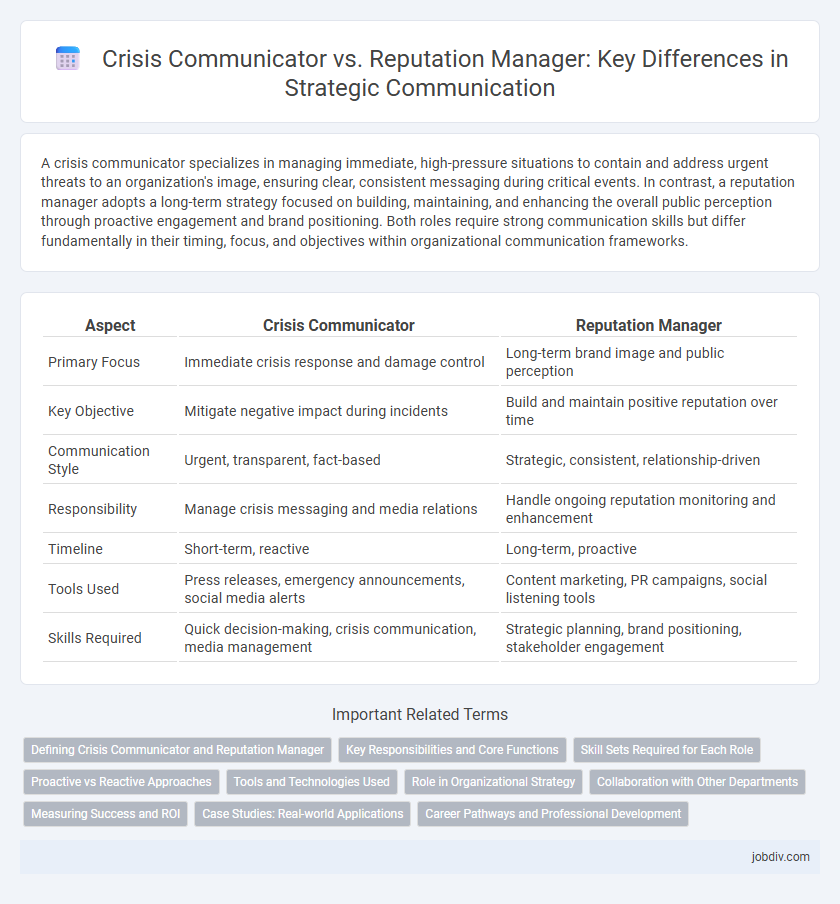A crisis communicator specializes in managing immediate, high-pressure situations to contain and address urgent threats to an organization's image, ensuring clear, consistent messaging during critical events. In contrast, a reputation manager adopts a long-term strategy focused on building, maintaining, and enhancing the overall public perception through proactive engagement and brand positioning. Both roles require strong communication skills but differ fundamentally in their timing, focus, and objectives within organizational communication frameworks.
Table of Comparison
| Aspect | Crisis Communicator | Reputation Manager |
|---|---|---|
| Primary Focus | Immediate crisis response and damage control | Long-term brand image and public perception |
| Key Objective | Mitigate negative impact during incidents | Build and maintain positive reputation over time |
| Communication Style | Urgent, transparent, fact-based | Strategic, consistent, relationship-driven |
| Responsibility | Manage crisis messaging and media relations | Handle ongoing reputation monitoring and enhancement |
| Timeline | Short-term, reactive | Long-term, proactive |
| Tools Used | Press releases, emergency announcements, social media alerts | Content marketing, PR campaigns, social listening tools |
| Skills Required | Quick decision-making, crisis communication, media management | Strategic planning, brand positioning, stakeholder engagement |
Defining Crisis Communicator and Reputation Manager
A Crisis Communicator specializes in managing urgent and high-pressure situations to control information flow and mitigate damage during unforeseen events. A Reputation Manager focuses on long-term brand perception, cultivating positive public opinion through strategic communication and consistent messaging. Both roles are crucial but differ in timing and scope, with crisis communicators addressing immediate threats and reputation managers overseeing ongoing image building.
Key Responsibilities and Core Functions
A Crisis Communicator focuses on managing urgent issues by delivering timely, clear messages to mitigate damage and control public perception during critical situations. Reputation Managers work proactively to build, maintain, and restore a brand's image through strategic communication, monitoring public sentiment, and addressing long-term reputation risks. Both roles require expertise in media relations, stakeholder engagement, and effective messaging, but Crisis Communicators prioritize immediate response while Reputation Managers emphasize sustained brand value.
Skill Sets Required for Each Role
Crisis communicators require expertise in rapid information dissemination, emotional intelligence, and real-time problem-solving to manage unfolding emergencies effectively. Reputation managers emphasize long-term brand strategy, media relations, and data analysis to maintain and enhance public perception over time. Both roles demand strong interpersonal skills, but crisis communicators excel in high-pressure environments while reputation managers focus on strategic planning and stakeholder engagement.
Proactive vs Reactive Approaches
Crisis communicators emphasize a proactive approach by identifying potential risks early and crafting clear, consistent messages to mitigate negative impacts before they escalate. Reputation managers often adopt a reactive strategy, addressing issues after they arise to repair trust and restore brand image through strategic engagement and transparent communication. Effective communication strategies balance both proactive crisis planning and reactive reputation management to safeguard organizational credibility.
Tools and Technologies Used
Crisis communicators rely heavily on real-time monitoring tools such as social media analytics platforms and rapid response management software to detect issues early and disseminate accurate information swiftly. Reputation managers utilize long-term brand tracking technologies, sentiment analysis, and customer feedback systems to assess public perception and guide strategic messaging over time. Both roles increasingly integrate AI-driven insights and automated communication channels to enhance responsiveness and maintain stakeholder trust.
Role in Organizational Strategy
Crisis communicators focus on real-time response and damage control during emergencies to protect the organization's integrity and maintain stakeholder trust. Reputation managers develop long-term strategies to build and sustain a positive public image, aligning communication efforts with branding and corporate values. Both roles are integral in organizational strategy, ensuring resilience through proactive reputation management and effective crisis mitigation.
Collaboration with Other Departments
Crisis communicators collaborate closely with legal, public relations, and executive teams to ensure messaging is accurate and compliant during emergencies, facilitating real-time information flow and rapid response. Reputation managers work with marketing, customer service, and HR departments to develop long-term strategies that enhance brand perception and resolve underlying issues affecting public trust. Both roles require seamless interdepartmental coordination to align communication efforts and protect the organization's image effectively.
Measuring Success and ROI
Crisis communicators measure success by response time, message clarity, and stakeholder trust restoration, using metrics like media sentiment analysis and crisis impact reduction. Reputation managers track long-term brand perception, customer loyalty, and social media engagement, leveraging surveys and net promoter scores to gauge ROI. Both roles employ data analytics to align communication strategies with organizational goals and quantify their contribution to business resilience.
Case Studies: Real-world Applications
Crisis communicators often handle urgent situations like product recalls or company scandals by delivering clear, timely messages that mitigate immediate damage, as seen in the Johnson & Johnson Tylenol poisoning case. Reputation managers focus on long-term brand perception, employing strategies such as corporate social responsibility campaigns and consistent public engagement, exemplified by Starbucks' recovery efforts after racial bias incidents. Case studies highlight that while crisis communicators prioritize rapid response, reputation managers build sustained trust through proactive relationship-building and brand positioning.
Career Pathways and Professional Development
Crisis communicators specialize in managing urgent, high-stakes situations that can impact an organization's immediate survival, requiring skills in rapid response, media handling, and stakeholder communication. Reputation managers focus on long-term brand image enhancement and consistency, emphasizing strategic planning, content creation, and relationship building with diverse audiences. Career pathways in crisis communication often lead to roles in emergency management and public affairs, while reputation management careers may advance towards corporate communications director or brand strategist positions, with both fields offering continuous professional development through certifications like the IABC Communication Management Professional (CMP) or the Public Relations Society of America (PRSA) Accreditation in Public Relations (APR).
Crisis Communicator vs Reputation Manager Infographic

 jobdiv.com
jobdiv.com